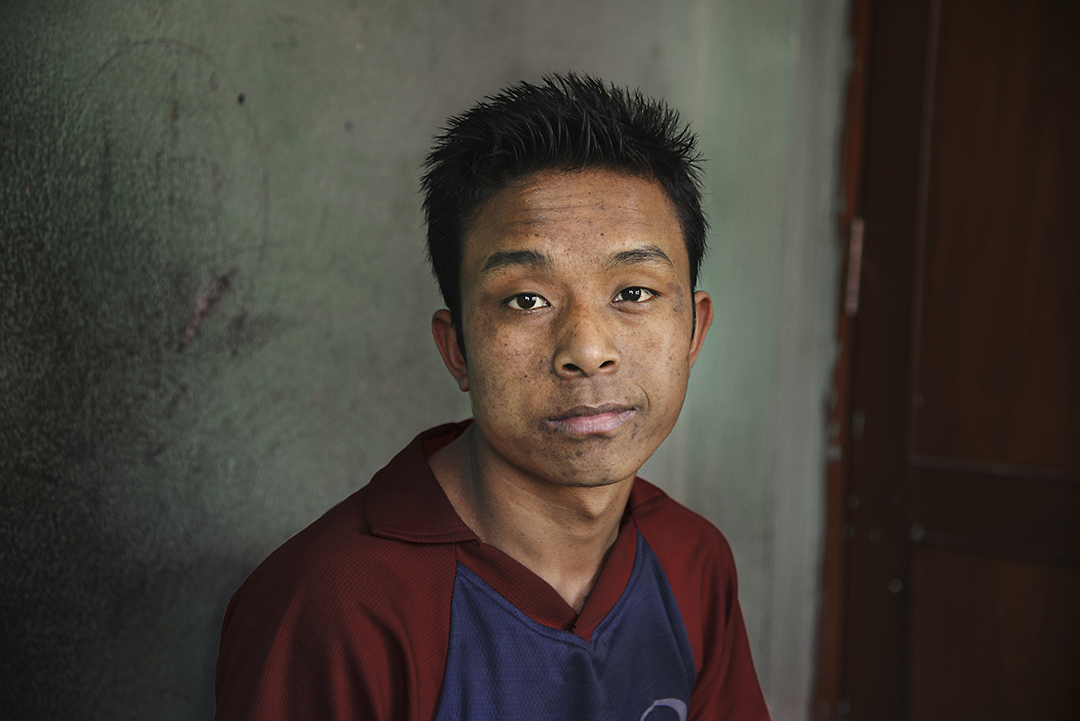
Bhupal goes to school now. A cousin who works as a domestic worker and a trade union organizer found a way to funnel him out of a life he says was like a ghost story and through a door that opened for him at a boarding school in Kathmandu. When he was 10 he began working for a family in his east Nepal village, although his wages were given to his father. For three years, the male employer, an out-of-work school teacher, routinely hit him. The two children, who were his age, also hit him frequently.
Says his cousin, who has worked since she was 7, “The reason why people want children as domestic workers is because they learn faster and they don’t argue much. They don’t have to deal with the money issue. Adults might argue—‘You don’t pay me enough.’ With my experience, you have to do the work. I was to take care of children but had to do everything—cooking, cleaning, watching the animals. You naturally do it, so you become able to do it.” Bhupal endured for two years because he thought his stepmother would beat him the same if he went home. He finally left. When his cousin found him scavenging for food, she brought him to live with her in Kathmandu until she found a way to open that door for him at the boarding school.
“Usually when you have children working for you,” the cousin continues to explain, “you think of them as your possession and you can do whatever you want to them. In Bhupal’s case, he had no one backing him up, to defend him. It made the employer feel not accountable to anyone, so he could treat him how he wanted. In my case, it was the same. It’s a small community and everyone knows everyone’s economic standing. They know Bhupal’s family has a bad situation, so they can treat him however they want. They are poor people and the employers think, ‘We can treat them how we want.’”
***
“My mother was ill. My father had a second wife. My aunty found the work for me, in the same village where I lived. I was taking the children to school and washing dishes and cooking rice, daal and meat for them. There were two children: a boy, 10 and a girl, 12. I lived there for two to three years. I started when I was 10 years old.
“I would work and my parents received the salary. I didn’t know how much. Once in a while I was given 100 rupees. Thursday was a break day. I would go around, hang out. The waking time was 7 a.m. I had to cook food before the adults go to work. At 9, I go to school and return at 4 p.m. and cook again and then I went to bed at 9 p.m. The two children go to private school and I went to the government school. I would take them to school and pick them up on my way home.
“They were not very nice. When I was sick, they wouldn’t care for me. It was not like a family where I’d be taken care of. They would just let me be. The kids were naughty. They would beat me, sometimes with their hands and sometimes with a stick. Sometimes I would be a little slow in cooking and they’d get upset and hit me. The father would also beat me. If the son and daughter do anything wrong or something bad, they would throw the blame on me and then the father would beat me. If a window glass or a cup was broken by them, they would tell the parents I did it. The father would just pick up anything he could get at hand and hit me. Once I had broken a cup and he hit me against the wall so hard, my head was cut. I still have this bump. I was beaten usually on my back. He would hit in places where it would be seen or to make big wounds. I was usually beaten with a stick that was quite big. He would also hit with his hands or whatever he could get a hold of. He would be abusive and call me names. He called me, accri, which means ‘big eyes’. Normally he should say, ‘Little one’, but he’d say acrri. It’s degrading.
“The father told me I should not tell anyone or he would hurt me more. When I got that wound and my father asked how it happened, I lied and said I had fallen down. The employer said, ‘If you tell anybody I will fire you. So I was scared. But if I got fired, I’d be sent home and my stepmother would beat me and I wouldn’t get enough to eat.
“My father wouldn’t have been able to do anything if I told him about the beating. When he was drunk, my father told the employer, ‘You can kill him. And if the youngest ones’ legs get stronger, I will send her to work also.’
“I always thought, ‘When can I leave this place?’ because of their behaviour. In my life, that was the worst experience. When I saw other children, I felt, ‘Why do I have to work like this?’ I wish I didn’t have to. I ate the leftovers after they finished. There wouldn’t be much left. If there was nothing left, I would just go to sleep.
“I didn’t have the guts to say anything. I would have just left. I cried so much. I would cry and go to my room and cry more. After a while he would soften a little bit. He never apologized. I had my own room. It was small. I was given a thin sheet and no blanket. I would wear warmer clothes. In the winter my fingers would get swollen and it would hurt when I worked.”
